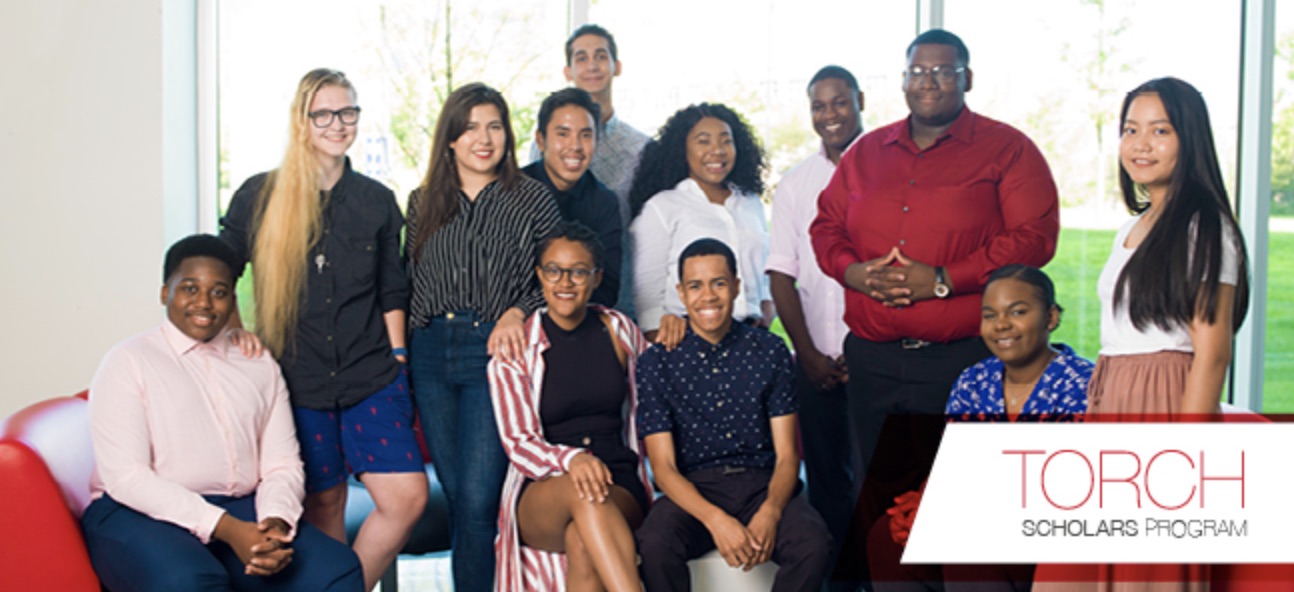College Planning Cohorts
Cultivating Conversational Communities
Scholarship • Leadership • Service
We now offer three distinct Cohort Programs. Our College Planning Cohort is offered both virtually and in-person to our school district partners. Our HBCU Cohort is a variation of our college planning cohort program that is HBCU-specific and offers both virtually and in-person sessions to our school district partners. Our Emerging Leaders Cohort is an all-virtual program offered to students in grades 9 – 11 (by application) from throughout the country.
College Planning Cohort (TM)
College Planning Cohort participation is available to any student in grades 9 – 12 attending school in our partner school districts. Students in grades 9 – 11 are guided through our 3 pillars of scholarship, leadership, and service in a manner consistent with expanding students’ college and scholarship opportunities.
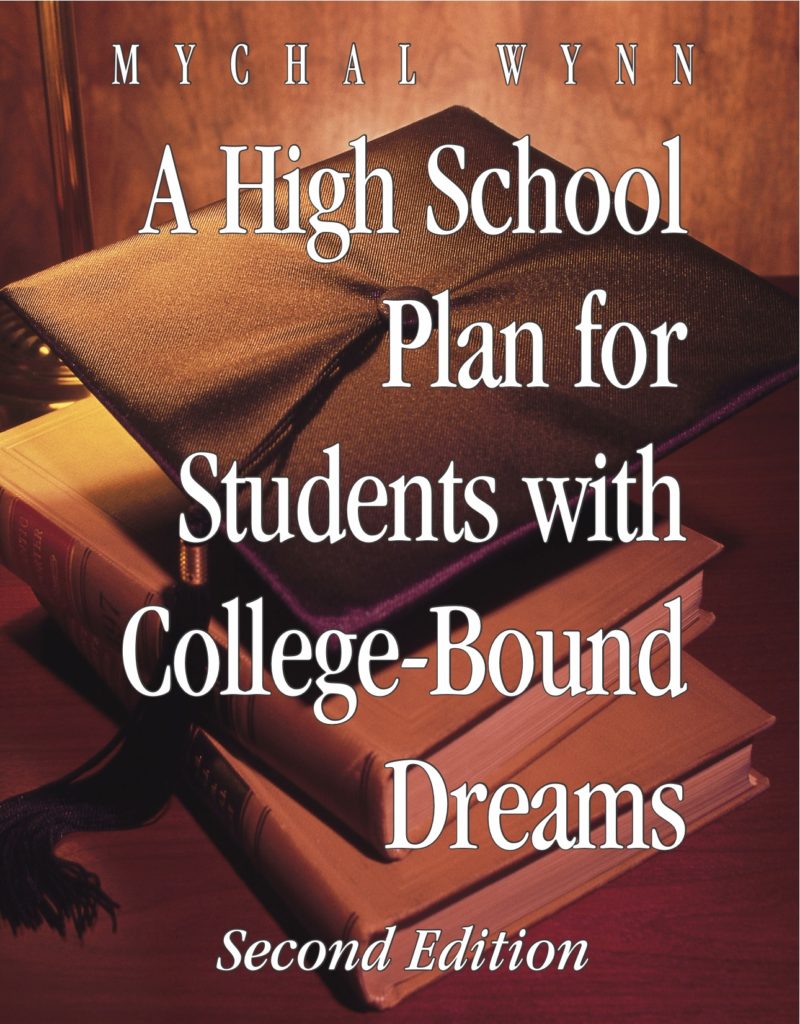 High school seniors receive comprehensive 1-on-1 guidance and wrap-around services, such as:
High school seniors receive comprehensive 1-on-1 guidance and wrap-around services, such as:
- Guiding students in selecting the Common Application prompt that will allow them to best tell their story and contextualize their college applications in a manner consistent with the selectivity of their colleges
- Developing, reviewing, editing, and proofreading college and scholarship essays
- Developing comprehensive college and scholarship lists to close financial aid gaps and minimize student and Parent PLUS loan debt
- Ensuring that senior-year course schedules meet the expectations of college admissions officers and scholarship providers
- Keeping students on track to meet college and scholarship deadlines
- Selecting admissions cycles to maximize college admissions and scholarship opportunities
- Selective college majors that are aligned with students’ “body of work”
- Teacher/Counselor guidance in writing recommendation letters
- Assisting students in matching to national and institutional scholarship programs
- Preparing students for college and scholarship interviews
- Assistance with completing the FAFSA
- Guidance in completing the Net Price Calculators to estimate college costs and student loan debt exposure
- Identifying college pathways aligned with students’ long term aspirations, i.e., career, graduate school, nursing school, medical school, dental school, pharmacy school, law school, etc.
- Developing résumés and transitioning high school résumés to college CVs
- Assistance with reviewing and appealing financial aid awards
- Assistance with reviewing college applications from the perspective of college admissions
- Supporting students throughout their undergraduate experience and recommending graduate school pathways
Curriculum:
- A High School Plan for Students with College-Bound Dreams: Third Edition
- A High School Plan for Students with College-Bound Dreams: Workbook
HBCU Cohort (TM)
Many Black students find the most academically supportive, intellectually enriching, culturally reflective, and emotionally and physically safe spaces at HBCUs. However, according to the UNCF report, “Fewer Resources, More Debt: Loan Debt Burdens Students at Historically Black Colleges and Universities,” (Saunders, et al. 2016) 80 percent of students attending HBCUs rely on federal student loans to finance their education.
Our HBCU Cohort program has been developed to address these dual needs of guiding students into the right HBCU and into the right scholarship pathway to avoid student loan debt. Similar to our College Planning Cohort, high school and community college students are guided through our 3 pillars of scholarship, leadership, and service in a manner consistent with expanding students’ first-year and transfer college and scholarship opportunities. However, the focus is HBCU-specific and supported by our Why Attend an HBCUseries of books.
 High school seniors and community college transfer students receive comprehensive 1-on-1 guidance and wrap-around services, such as:
High school seniors and community college transfer students receive comprehensive 1-on-1 guidance and wrap-around services, such as:
- Guiding students in selecting the Common Application prompt that will allow them to best tell their story and contextualize their college applications in a manner consistent with the selectivity of their colleges
- Developing, reviewing, editing, and proofreading college and scholarship essays
- Developing comprehensive college and scholarship lists to close financial aid gaps and minimize student and Parent PLUS loan debt
- Ensuring that senior-year course schedules meet the expectations of college admissions officers and scholarship providers
- Keeping students on track to meet college and scholarship deadlines
- Selecting admissions cycles to maximize college admissions and scholarship opportunities
- Selective college majors that are aligned with students’ “body of work”
- Teacher/Counselor guidance in writing recommendation letters
- Assisting students in matching to national and institutional scholarship programs
- Preparing students for college and scholarship interviews
- Assistance with completing the FAFSA
- Guidance in completing the Net Price Calculators to estimate college costs and student loan debt exposure
- Identifying college pathways aligned with students’ long term aspirations, i.e., career, graduate school, nursing school, medical school, dental school, pharmacy school, law school, etc.
- Developing résumés and transitioning high school résumés to college CVs
- Assistance with reviewing and appealing financial aid awards
- Assistance with reviewing college applications from the perspective of college admissions
- Supporting students throughout their undergraduate experience and recommending graduate school pathways
Curriculum:
- Why Attend an HBCU
- HBCU Scholarships…and more*
- HBCU STEM Pathways
- HBCU Healthcare Pathways
- Their Stories: Inspiring Essays of Students from Challenging Backgrounds
Emerging Leaders Cohort
Our Emerging Leaders Cohort is a college planning and leadership development multi-year program for students in grades 8 – 11. Students must apply to the program and present evidence that they are serious about their college planning and willing to make a commitment to our 3 pillars of scholarship, leadership, and service. While the program is a multi-grade level program, students may be assigned to grade-level appropriate discussion groups as needed. All monthly discussions will be facilitated by Rev. Dr. Yolanda Davis.
Program Components:
- Over the course of 9 months from September through May, students will participate in a small group discussion on the second Saturday of each month (10:00 am – Noon EST) during which they discuss the reading, activities, and an assigned monthly topic.
- The monthly discussions are based on a monthly theme beginning with setting school-year goals consistent with each student’s affirmed college and career aspirations.
- Participating students must commit to using their gifts, talents, and voices to support the work of our foundation as part of developing the overall body of work required to establish themselves as highly competitive college and scholarship applicants.
- Students will develop collaborative, narrative writing, presentation, debate, and critical thinking skills.
- Interested students must download, complete, and return the application, with all requested documents to be considered for the program.
- If students are accepted into the Emerging Leaders Cohort, they must agree to the following:
- No unexcused absences over the course of the 9 monthly meetings.
- They must turn on their cameras and actively participate in the discussions.
- They must complete the assigned reading and activities between meetings to be sufficiently prepared to contribute to the discussions.
- They must be openly transparent with sharing their grades, classes, test scores, and personal goals.
- They must be willing to contribute their gifts and talents to furtherance of the goals of our foundation.
- Once accepted into the program, students must pay the $495.95 per year, non-refundable registration fee. Students with financial need may request a need-based scholarship from our foundation.
- 2 unexcused absences, or failure to meet the expectations as set forth will result in removal from the program. Students who are removed from the program will not be refunded their registration fee.
Participating students will receive online access to our curriculum and all required books and materials.
Responding to Inequity
 While any student attending school in our partner school districts may join our college planning cohort program, our program was developed by our founders, Mychal and Nina Wynn, to address the inequities in college admissions and student loan debt—both of which contribute to the wealth gap in America. In the article “American Wealth is Broken,” Maura Cheeks, daughter of Mr. Wynn’s DuSable High School classmate and retired professional basketball player, Maurice Cheeks, recounts an all too familiar story:
While any student attending school in our partner school districts may join our college planning cohort program, our program was developed by our founders, Mychal and Nina Wynn, to address the inequities in college admissions and student loan debt—both of which contribute to the wealth gap in America. In the article “American Wealth is Broken,” Maura Cheeks, daughter of Mr. Wynn’s DuSable High School classmate and retired professional basketball player, Maurice Cheeks, recounts an all too familiar story:Maurice Cheeks grew up in Chicago’s Robert Taylor Homes, once the largest public-housing development in the country; it’s now gone—the last building was torn down in 2007. The development opened in 1962, housing up to 27,000 people despite being planned to hold less than half of that. By 1975, 92 percent of the families relied on government assistance. My grandmother was well known around the building she lived in. She used to belt out my dad’s and uncles’ names to get them to come inside as soon as the street lights turned on. Secretary of Housing and Urban Development Henry Cisneros once said, ‘ don’t know of another place in America where there are 15 shootings and five killings over a weekend.’ My dad’s general feeling was that you lived your life as best you could. ‘it was rough,’ my dad told me. ‘But we didn’t really think about it at the time.’
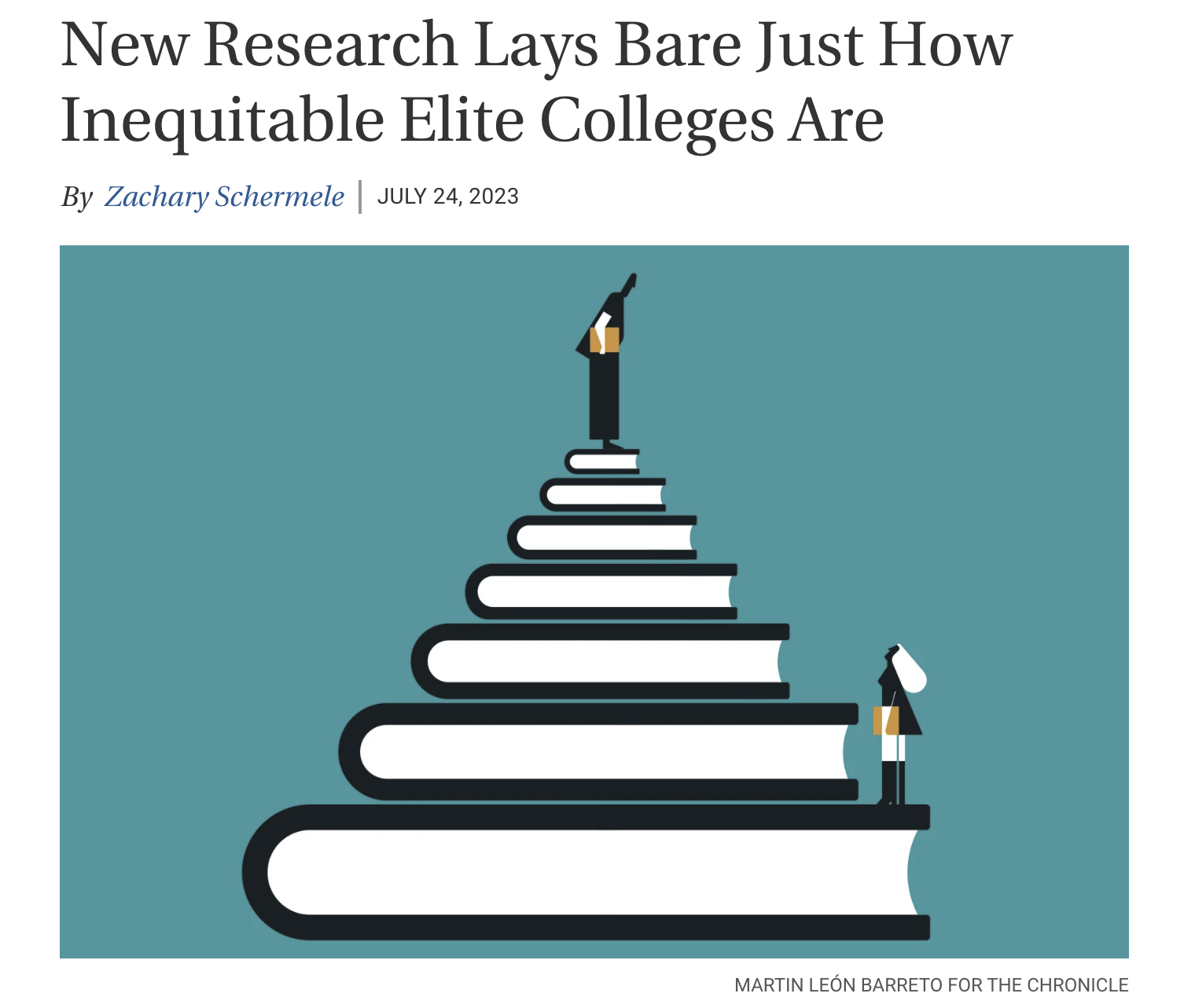
Though the nation’s most-selective private colleges have long been criticized for perpetuating inequality, a sweeping new study has reached a stark conclusion: They “amplify the persistence of privilege across generations.”
Research released Monday from three education scholars at Harvard and Brown Universities pulls from a trove of data, including federal tax returns, standardized-test scores, and application and admissions records, some of which were anonymously provided to the researchers by selective colleges.
The study looked at “Ivy-Plus” colleges, defined as the eight Ivy League colleges plus Stanford University, the Massachusetts Institute of Technology, Duke University, and the University of Chicago.
Their conclusion is decisive: getting into one of those colleges “dramatically changes children’s life trajectories.” Then, after those students graduate, they’re more likely to make more money than their peers who were educated elsewhere.
Our Program is One of a Kind
Note: Since recording this video, Kimberly is approaching the completion of a PhD in Math; Omar (creator of the video) is now attending Brown University and is a Jack Kent Cooke College Scholar; Josiah is a QuestBridge College Match Finalist and has been offered admission (together with full scholarships) to Boston College, Macalester College, Northeastern University, Washington & Lee University, and Williams College; and Jocelyne has been offered admission, together with a full scholarship, to Brown University. Other students from the youth leadership board: TaRetta is attending North Carolina A&T State University on a full scholarship; Jayla is attending Williams College on a full scholarship; Anna has been offered admission to the honors college at the University of South Florida; and Sydney has received a BS in Neuroscience from The University of Chicago is now applying to medical school.
7-year Curriculum
- From whose viewpoint are we seeing or reading or hearing? From what angle or perspective?
- How do we know when we know? What’s the evidence, and how reliable is it?
- How are things, events, or people connected to each other? What is the cause and what is the effect? How do they fit together?
- What’s new and what’s old? Have we run across this idea before?
- So what? Why does it matter? What does it all mean?
Through the process of deeply considering their current goals and long-term aspirations within a college planning context, students increase their critical thinking skills as they continuously ponder, “What is the right college for me? Where will I receive the most financial aid? How can I further develop my body of work?”
- 9th graders EXPLORE and ESTABLISH themselves for making a successful transition into high school through a yearlong focus on study skills and planning their high school trajectory across our 3 pillars of scholarship, leadership, and service.
- 10th graders REVISIT and RE-AFFIRM their successful approach to studying and learning and aligning scholarship pathways with their academics, leadership, service, and gifts and talents.
- 11th graders PLAN to pursue specific college and scholarship pathways.
- 12th graders IMPLEMENT THEIR PLANS in pursuing their affirmed college and scholarship pathways.
College Planning is All About Strategy
If increasing college readiness and expanding college access was all that was needed, student loan debt would not be so high and college completion rates so low. The table presented below, taken from the SallieMae report, “How America Pays for College 2018” provides insight into the $1.56 trillion student loan debt crisis and the disproportional load being carried by students from demographically identifiable subgroups.

College Readiness and Culturally Relevant
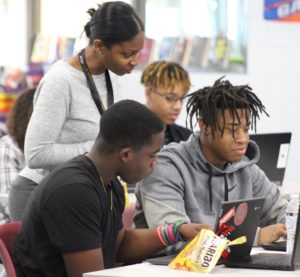 Our program meets the standards of the U.S. Department of Education ESSA, Title IV, Part A which focuses on increasing student achievement with access to a well-rounded education; increasing students’ technology proficiency and digital literacy; supporting college and career counseling; promoting access to accelerated learning opportunities such as AP, IB, and dual enrollment; promoting parent involvement; establishing community partners; innovative uses of technology; providing high quality digital learning opportunities; and delivering specialized curricula using technology. However, our program not only meets federal guidelines, but inspires. Our curriculum is culturally relevant in both content and student outcomes. Diverse student profiles are embedded in our curriculum so that students see themselves in the curriculum and are exposed to the college and scholarship pathways chosen by students from similar socioeconomic and cultural backgrounds. Students are exposed to postsecondary pathways into technical schools, community colleges, research universities, liberal arts colleges, military academies, HBCUs, High Hispanic Serving Institutions, and first generation-friendly institutions and support programs.
Our program meets the standards of the U.S. Department of Education ESSA, Title IV, Part A which focuses on increasing student achievement with access to a well-rounded education; increasing students’ technology proficiency and digital literacy; supporting college and career counseling; promoting access to accelerated learning opportunities such as AP, IB, and dual enrollment; promoting parent involvement; establishing community partners; innovative uses of technology; providing high quality digital learning opportunities; and delivering specialized curricula using technology. However, our program not only meets federal guidelines, but inspires. Our curriculum is culturally relevant in both content and student outcomes. Diverse student profiles are embedded in our curriculum so that students see themselves in the curriculum and are exposed to the college and scholarship pathways chosen by students from similar socioeconomic and cultural backgrounds. Students are exposed to postsecondary pathways into technical schools, community colleges, research universities, liberal arts colleges, military academies, HBCUs, High Hispanic Serving Institutions, and first generation-friendly institutions and support programs.
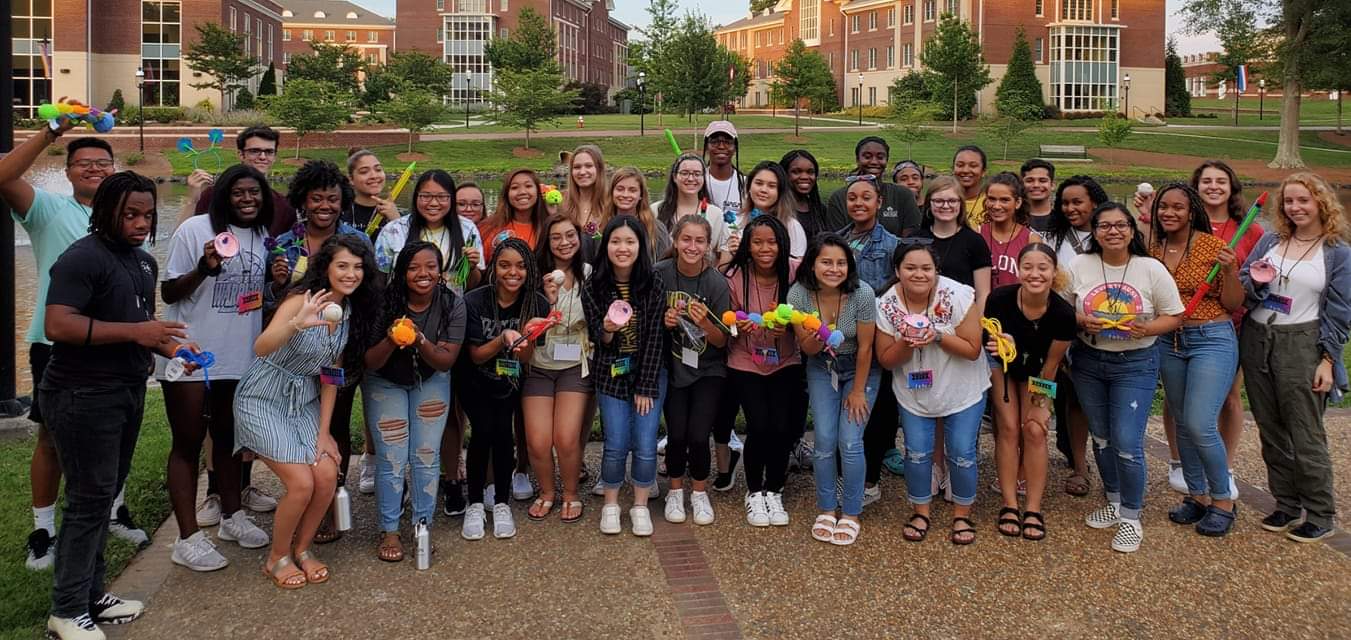
Our cohort students are choosing to be intentional in their college planning and are among the top performing and most motivated students in their respective schools; are measurably increasing their GPAs and SAT/ACT scores; are enrolling into the most rigorous classes; and are performing thousands of hours of community service and assuming leadership roles across an array of clubs, organizations, activities, and athletic teams.
 As a result of making informed college choices, our cohort students are assuming student loan debt at a far lower rate than the national average and graduating on time at a rate far higher than the national average. We are proud of the many hundreds of students with whom we have worked who are choosing to “Own the Process.”
As a result of making informed college choices, our cohort students are assuming student loan debt at a far lower rate than the national average and graduating on time at a rate far higher than the national average. We are proud of the many hundreds of students with whom we have worked who are choosing to “Own the Process.”
In 2019 Elon University Odyssey Scholar, Yuzu Do, from our Guilford County Schools Cohort was awarded 3 full scholarships and accepted the full scholarship to Elon University. Yuzu, a first generation immigrant from Vietnam, is pictured above (fifth from left in the front row) with other Odyssey Scholars.
In 2023, Yuzu went on to graduate from Elon University with two degrees—BS and MS in Accounting.
In 2018 Torch Scholar, Damian Lee from Florence County School District 3 Cohort (SC) (seated on the far left), was offered 3 full scholarships and accepted the full scholarship to Northeastern University.
In 2023, Damian received a BS in Political Science and Africana Studies from Northeastern, was selected as one the inaugural Northeastern University Senior Leadership Award recipients, and subsequently offered a full fellowship to graduate school at Northeastern.

The Differences Between College Planning, College Readiness, and College Awareness
Typically, school, mentoring, and community-based programs provide college readiness or expand college awareness through social skill development, study skill development, college tours, and conversations about college and careers. However, college planning is largely relegated to private college admissions counselors or advisors who work one-on-one with students or in small groups for fees ranging from a few hundred dollars to several thousand dollars. The Princeton Review “Ultimate Admissions Package” costs $2,799 and is targeted toward high school seniors who are ready to apply to college. Private College Advisors can easily cost $10,000 for a Common Application and essay review.
In the article, “How Much Would You Pay to Get Your Child into Harvard,” the $10,000 consultant fee was paid by a family to increase the odds of their child being offered admission to Amherst College—where our older son received his degree and where we have successfully assisted many cohort students in being offered admission. One of our Guilford County Schools Cohort students, Brenna Kaplan, posted a video sharing her journey, and our guidance, into Amherst College.
We are the only nonprofit community-based organization (CBO) with a comprehensive proprietary research-based and research-responsive curriculum providing college planning guidance freely to students and families in our partner school districts; at a deeply discounted price for students at our faith- and community-based partners, and at minimal price directly to students and families through our online program. In contrast to college readiness and college awareness, college planning involves course planning, summer planning, college/career research, self-assessment, leadership development, focusing community service activities, choosing the right extracurricular activities, social media assessment, navigating online portals, communicating with college admission and financial aid officers, completing the FAFSA and CSS Profiles, personality type profiles, multiple intelligences, narrative writing, institutional and private scholarship research, reviewing and negotiating financial aid award letters, and setting short- and long-term goals within a grade level specific and strategic context. Students and parents, particularly those who will be the first in their family to attend college, need assistance with navigating the FAFSA and CSS Profile, and communicating with college admission and financial aid officers. All of these areas are covered in our printed materials, throughout our online curriculum, and through one-on-one conversations with students and families.
Click here to download a brochure
Click here to download our Pinellas County Schools Program Outcomes
